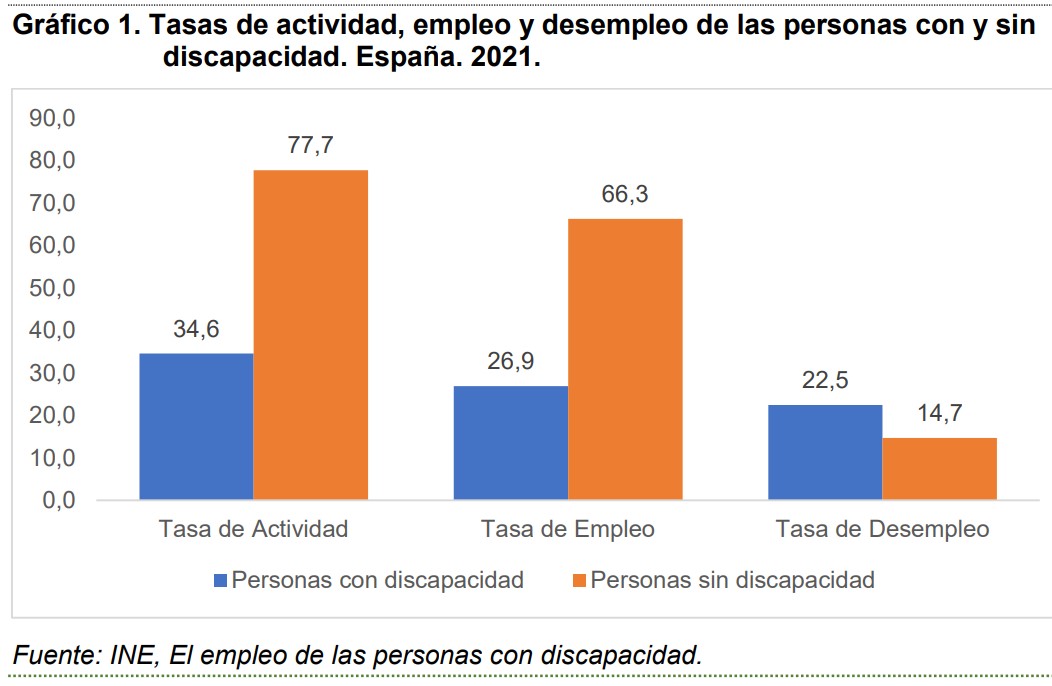In this post, we will explore the employment situation of individuals with intellectual disabilities in Spain, with a special focus on Special Employment Centers (SECs), such as the TEB Cooperative Group, to which the “TColors – Painting that Changes Everything” project belongs, providing employment opportunities. This will allow us to understand the importance of acquiring the paintings. TColors.
The central goal of the TEB Cooperative Group and CETs in general is the social and labor integration of individuals with intellectual disabilities These centers not only focus on creating job opportunities but also provide comprehensive responses to the needs of individuals and their families in this group The SECs have a comprehensive psychosocial support team that accompanies these individuals throughout their working life. In the case of TEB, we have approximately 200 people dedicated to this task.
In addition to job creation, the Cooperative Group TEB also provides housing for those who need it. In addition, we have adapted sports teams that participate in Special Olympics Spain, and a TEB Foundation that provides support to those who have lived and worked at TEB throughout their senior years. This vision demonstrates how CETs create an environment that enables individuals with intellectual disabilities to enjoy an excellent quality of life and autonomy.
It’s important to highlight that TEB is a non-profit CET, which means that all income generated from the sale of products or services is reinvested in the organization. This philosophy further contributes to the mission of supporting individuals with intellectual disabilities.
The inclusion of people with intellectual disabilities in the workforce is a crucial issue in our society. In spite of advances in awareness and legislation in favor of equal opportunities, significant challenges still persist for these individuals in the workplace. One of these challenges is the unemployment rate that affects this group and how Special Employment Centers (CETs) play a fundamental role in their inclusion.
Unemployment among people with intellectual disabilities.
Unemployment is a problem that affects globally, but individuals with intellectual disabilities often face additional barriers to finding and maintaining employment. Despite their abilities and desires to contribute to the workforce, people with intellectual disabilities face discrimination, stigmatization, and a lack of adequate support to access the job market.
The unemployment rates among people with intellectual disabilities tend to be higher compared to the general population. This not only has a negative impact on the quality of life for these individuals but also represents a loss of talent and potential for society as a whole.
According to data from the National Institute of Statistics (INE), in the year 2020, there were 1,860,600 people in Spain with some type of disability, of which 373,900 had an intellectual disability. Of these, only 25.4% were employed, compared to 48.9% of the total population with disabilities and 55.5% of the general population.
This means that people with intellectual disabilities have a very low labor force participation rate (32.8%) and a very high unemployment rate (22.7%), reflecting the difficulties they encounter in accessing the regular job market.
The role of Special Employment Centers (SECs).
One of the alternatives that exist to promote the employment of people with intellectual disabilities are CETs, which are companies that, like the TColors project of the TEB Cooperative Group, have at least 70% of their workforce composed of employees with disabilities. hese centers offer their employees work tailored to their abilities and needs, as well as personalized support and ongoing training.
The CET of the TEB Cooperative Group and the TColors project are entities whose main objective is the labor integration of people with disabilities. These centers offer sheltered employment tailored to the abilities and individual needs of workers with intellectual disabilities. In addition, they provide training and the necessary support for these individuals to develop their job skills and reach their full potential.
The existence of CETs is essential to address the problem of unemployment among people with intellectual disabilities. By providing an inclusive and tailored working environment, these centers not only create employment opportunities for this group but also promote their autonomy and self-esteem.
According to the report “Employment of People with Disabilities” from the State Disability Observatory (OED), in 2019 there were 2,253 Special Employment Centers (SEC) in Spain, providing jobs to 77,262 people with disabilities, of whom 29,892 had an intellectual disability. This implies that 38.7% of the workers in the CETs had an intellectual disability, highlighting the significance of these centers for this group.
Challenges and opportunities.
In spite of the importance of CETs like the TEB Cooperative Group, they face challenges such as a lack of adequate funding and resources. To improve the employment situation for individuals with intellectual disabilities, a continuous commitment is required from governments, businesses, and society as a whole.
In addition, it is essential to promote awareness and education about the abilities and contributions of individuals with intellectual disabilities in the workplace. Diversity in the workplace not only enriches companies but also strengthens social cohesion.
The CETs (Centers for Temporary Employment) have also been affected by the economic and health crisis caused by the COVID-19 pandemic, which has resulted in a decrease in activity and demand, as well as an increase in costs and protective measures. According to the report “Impact of COVID-19 on the employment of people with disabilities” by the OED, in 2020, 4,903 jobs were lost in CETs, which represents a decrease of 6.3%. In English, that would be: “Out of these, 2,144 corresponded to individuals with intellectual disabilities, representing a decrease of 7.2%.”
These data highlight the vulnerability of individuals with intellectual disabilities in the face of crises and the need to strengthen support for CETs (Centers for Employment Support) as key tools for their labor inclusion. In order to achieve this, measures such as increased public funding, the promotion of responsible public procurement, the enhancement of the quality and innovation of services and products offered by CETs, and the promotion of collaboration among the stakeholders, including public administrations, social entities, regular businesses, and labor unions, are required.
In summary
In the end, overcoming the challenges of unemployment among individuals with intellectual disabilities requires a collective effort from society. To promote a more inclusive and equitable society for all, the support of individuals and companies is essential. We would like to thank companies such as Leroy Merlin, Cositasmonas, Ditrisantiago, Comercial del Sur de Papelería, and Ferbirc for their support in showcasing our projects and selling our TColors products. We hope that more companies and organizations will join our project





